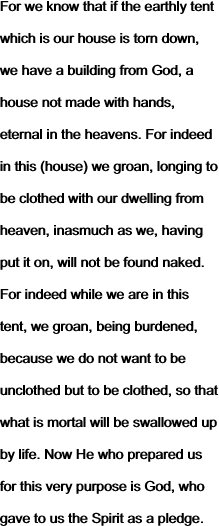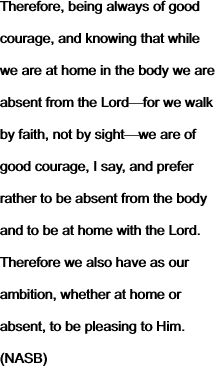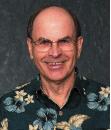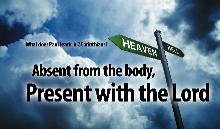 |
|
HOME | PROCLAMATION! MAGAZINE | DEVOTIONALS | STUDIES | LETTERS | ABOUT US | RELATED WEBSITES |
|
HOME / PROCLAMATION! MAGAZINE / 2008 / JULY/AUGUST / RATZLAFF
JULY / AUGUST 2008
VOLUME 9, ISSUE 4
A R T I C L E S
Absent from the body, present with the Lord
What does Paul teach in 2 Corinthians?
Dale Ratzlaff
This section of Scripture is foundational to interpreting the New Testament understanding of the human spirit and what happens to Christians at the point of death. While section headings are not inspired, they nevertheless convey what the Bible translators understood the passage to be teaching. The KJV heads this section with "Paul's Assured Hope Of Immortal Glory." The NIV leads with "Our Heavenly Dwelling", and the NASB entitles this section, "The Temporal and Eternal". This section is didactic teaching by the leading theologian of the New Testament, the Apostle Paul, who received the gospel from the risen Christ (Galatians 1:11–12). Therefore, it carries the highest teaching weight, more than poetry, more than the old covenant shadowy statements. But what does this section teach?
Remember our first rule of hermeneutics: we must consider the context. In 2 Corinthians 3 Paul contrasts the old and new covenants. He likens the Sinaitic Covenant, including the expanded covenant (written with ink v. 3) and the words of the covenant—Ten Commandments1 (written on stone v. 7) to a ministry of "condemnation" (v. 9), one that was "fading away" (v. 11) and one that actually "veils" the glory of the new covenant. He concludes the chapter by stating that "the Lord is the Spirit, and where the Spirit of the Lord is, there is liberty. But we all, with unveiled face [free from the Sinaitic covenant]2 beholding as in a mirror the glory of the Lord, are being transformed into the same image from glory to glory, just as from the Lord, the Spirit."
In 2 Corinthians 4 Paul describes his apostolic ministry. In verse 7 he states that "we have this treasure in earthen vessels." What is the "treasure" of which he speaks? It is the Life of Christ, the eternal life we now have in the spirit.3 This becomes clear as we read v. 11, "…we are constantly being delivered over to death for Jesus' sake, so that the life of Jesus also may be manifest in our mortal flesh." Then in v. 16 Paul states, "Therefore we do not lose heart, but though our outer man [body] is decaying, yet our inner man [spirit] is being renewed day by day." He ends chapter 4 with, "While we look not at the things which are seen [physical], but at the things which are not seen; [spiritual] for the things which are seen [outer man, body] are temporal, but the things which are not seen [inner man, spirit] are eternal." Paul's focus is not on the earthly life in the body, but it is directed to the heavenly, eternal existence in the spirit. For this reason, he can face hardship, persecution and even death with confidence. This is the context. Now, in chapter 5, Paul will develop his theology further. We now do a verse by verse study using the updated NASB.
For we know that if the earthly tent which is our house is torn down, we have a building from God, a house not made with hands, eternal in the heavens (2 Corinthians 5:1).
This verse is loaded. First, note the confidence expressed—"we know". This is not some wishful theory, some speculative idea, but it is stated as well-established Christian theology known by Paul and his associates. It is designed to bring comfort to those who live in uncertain times. There is no question that Paul uses "earthly tent" here to refer to the body. It is the "house" in which we dwell. In other words, the body is the home of the spirit. The body is not the personality; rather the spirit/soul is the person that lives within the body. If this tent is torn down (body destroyed in death) Paul states categorically that we have (present indicative active in Greek) a building from God. Again, note well the words. Paul does not say that we will have a building at some future time, but we now have, (we now possess this asset) a building (place to live) from God. This heavenly house is not made with hands (not of human devising) and is eternal in the heavens. When one form of existence comes to an end and our earthly tent (body) is folded up, we immediately have another existence awaiting us in heaven with God, and this existence is eternal. There is no uncertainty in Paul's teaching. "We know…We have."
For indeed in this house we groan, longing to be clothed with our dwelling from heaven (2 Corinthians 5:2).
As the years pass and old age approaches, Paul's statement becomes more understandable. Yes, in this body we do at times "groan". We long to be transformed into our eternal existence to escape the deterioration, pain and suffering experienced as this "tent" is being torn down. There is a real sense in which Christianity is focused on the next life. We long for it, we wait for it, and we desire it above all else. It is this assurance that allows the Christian to face death without fear.
Inasmuch as we, having put it on, will not be found naked (2 Corinthians 5:3).
The NASB is very literal and supports the idea expressed by the Greek aorist participle that the "putting on" is an accomplished event.4 Paul is building assurance, not doubt, and this rendering agrees with Paul's statement in 5:1, "We have", the present continuous tense in Greek. While we may not see our heavenly clothing at this time, nevertheless we have already put it on. This happened when we first believed in Christ.5 Because of this accomplished fact, we will not be found naked without our heavenly clothing of Christ's righteousness and life in the spirit.
For indeed while we are in this tent, we groan, being burdened, because we do not want to be unclothed but to be clothed, so that what is mortal will be swallowed up by life (2 Corinthians 5:4).
In this verse Paul describes us all. We do not want to be "unclothed" in nonexistence. We do not look forward to having the worms destroy our body, nor is there any comfort in simply being nonexistent until the resurrection. Rather, Paul's hope is that there will be an immediate transfer of life that now exists in the mortal tent of our bodies directly into the heavenly existence of life in the spirit with Christ. One level of life will be "swallowed up" by the next.
Now He who prepared us for this very purpose is God, who gave to us the Spirit as a pledge (2 Corinthians 5:5).
God is the one who has been working for us and in us for the express purpose of mortality being swallowed up by life. The Holy Spirit, given to all true believers, is the great down payment, guaranteeing the coming change.
Therefore, being always of good courage, and knowing that while we are at home in the body we are absent from the Lord— [7] for we walk by faith, not by sight— [8] we are of good courage, I say, and prefer rather to be absent from the body and to be at home with the Lord. [9] Therefore we also have as our ambition, whether at home or absent, to be pleasing to Him (2 Corinthians 5:6–9).
These three verses must be studied together as the theme is intertwined throughout. The "Therefore" refers back to the fact that we have already received the Holy Spirit who seals all true Christians when they believe,6 and He guarantees our future inheritance in Christ.7 This, in turn, gives us good hope. Now we come to the "meat" of this passage: "knowing that while we are at home in the body we are absent from the Lord…" Again, note the assurance, "knowing". This is not speculation or wishful thinking; it is "knowing."
"While we are at home in the body" must mean the eternal spirit or inward man, mentioned in Chapter 4:16–18, that is living in our "tent" or body. Notice that Paul very clearly indicates that his existence is separate from the body which is the temporary "home" for the spirit. Now Paul clearly says that during this life we are "absent from the Lord." He inserts, "We walk by faith, not by sight." Physical sight or visible evidence does not easily prove the after life. We must grasp it by faith. Not blind faith, but (1) a faith which rests upon the literal resurrection of Jesus who is our life; (2) the Holy Spirit-inspired Word of God and (3) the reality of the new birth—being born of the spirit."8 Paul now reaffirms that he and his companions are of good courage, meaning that they are walking by faith because they already know they have an invisible but real dwelling from God.
Paul states, "I say, and prefer rather to be absent from the body and to be at home with the Lord." Paul cannot be speaking of an existence after the resurrection of the body, for then he would not be "absent from the body." Rather, he must be speaking of the intermediate state between death and the resurrection. He describes this existence as being "at home with the Lord." We now come to the clincher, "Therefore we also have as our ambition, whether at home or absent, to be pleasing to Him." Paul's ambition is to be pleasing to the Lord both now in this life and in the after life including the time between death and the resurrection of the body. To describe this existence as unconscious sleep—really annihilation—simply does not fit the context. "An ambition to be pleasing" is strong evidence of a living personality that has active intellect, emotion and will and not unconscious sleep—which is essentially annihilation. Therefore, when we look at the context of this section and what it teaches, we must conclude that there is a conscious existence between death and the resurrection when we will be "absent from the body and at home with the Lord." This existence is one that allows for the function of an active intellect, emotion and will that is to be "preferred" to our present life "in the body." As mentioned above, this theology and the resulting assurance it brings hinges on the certainty of the historical bodily resurrection of Jesus, the trustworthiness of the Word of God and reality of the miracle of the new birth which regenerates our dead spirit such that we can be called "new creatures in Christ Jesus". In harmony with this conclusion later in this same chapter Paul states,
"Therefore from now on we recognize no one according to the flesh; even though we have known Christ according to the flesh, yet now we know Him in this way no longer. Therefore if anyone is in Christ, he is a new creature; the old things passed away; behold, new things have come (2 Corinthians 5:16, 17).
Assurance
Several years after I left the Adventist Church I served as the pastor of the Neighborhood Church in Santa Cruz, California. I will never forget the first funeral I attended in this Christian & Missionary Alliance Church. One of the older church members who had been friends with the District Superintendent, Rev. Dick Taylor, had died. The family requested that Rev. Taylor do the service. There was a rousing time of singing joyful, upbeat songs. There were many happy faces. The message was not only one of hope in the resurrection but also of a present assurance that our brother in Christ had "gone to be with the Lord!" Sure, there were a few tears after the service, but the mood was one that I had never experienced at an Adventist funeral. The joy at this funeral was based upon the present reality that our brother in Christ was now rejoicing at home with the Lord—which is far better!
The theology of the eternal, born-again human spirit fits into the new covenant paradigm of good news. It makes sense out of the many statements of Jesus. "He who believes has (present continuous) eternal life" (John 6:47) "I am the resurrection and the life; he who believes in Me will live even if he dies and everyone who lives and believes in Me will never die" (John 11:25, 26). †
Endnotes
- The Ten Commandments are the very words of the old covenant. See Exodus 31:18; 34:28; 40:20; Deuteronomy 4:13; 9:9; 9:11; 9:15; 1 Kings 8:9, 21.
- Galatians 3:17–29; Romans 7:6; Hebrews 8:13–9:4.
- See also John 6:47, 63; Romans 8:2, 11; 2 Corinthians 3:6; Galatians 6:8.
- The New King James renders this verse, "if indeed, having been clothed, we shall not be found naked."
- John 3:4–6.
- Ephesians 1:13; 4:30.
- See also 1 Corinthians 1:21, 22; Ephesians 2:22.
- John 3:4–6.
![]()
Copyright 2008 Life Assurance Ministries, Inc., Glendale, Arizona, USA. All rights reserved. Revised September 24, 2008. Contact email: proclamation@gmail.com
![]()


 Dale Ratzlaff is the founder of Life Assurance Ministries, Inc, and owns LAM Publications, LLC. He served as an Adventist pastor for 13 years, seven at Monterey Bay Academy where he taught Bible. He and his wife Carolyn left the Adventist church in 1981 when he realized he could no longer teach the investigative judgment in clear conscience. He has authored Sabbath in Christ, The Cultic Doctrine of Seventh-day Adventists, The Truth About Seventh-day Adventist "Truth", and Adventist to Christian. These are available through his website, LifeAssuranceMinistries.com.
Dale Ratzlaff is the founder of Life Assurance Ministries, Inc, and owns LAM Publications, LLC. He served as an Adventist pastor for 13 years, seven at Monterey Bay Academy where he taught Bible. He and his wife Carolyn left the Adventist church in 1981 when he realized he could no longer teach the investigative judgment in clear conscience. He has authored Sabbath in Christ, The Cultic Doctrine of Seventh-day Adventists, The Truth About Seventh-day Adventist "Truth", and Adventist to Christian. These are available through his website, LifeAssuranceMinistries.com.
